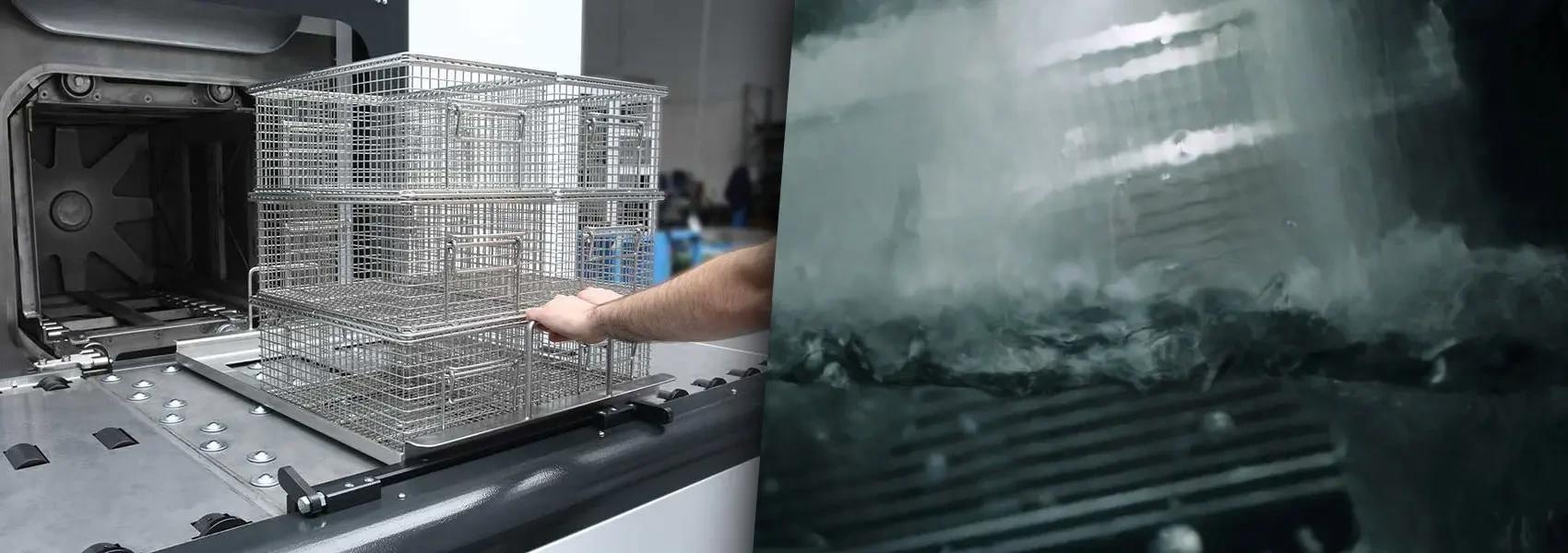The term ‘medical devices’ covers a wide range of products. These include surgical instruments and tools that are not left in the body or orthopedic and dental implants designed to remain inside the patient.
There are highly restrictive parameters and controls surrounding the cleaning of these types of components, as expected, especially for surgical tools or instruments that are designed to stay inside the body. Any contamination that may occur from the part’s manufacture must be completely removed, whether abrasive particles, cutting oils, or polishing paste.
This must be done in addition to ensuring that the detergents and cleaning process do not leave any potentially harmful residue that could be detrimental to the patient.
The cleaning process must adhere to several regulations and standards before it can be adopted. CLP regulations determine how a product must be identified and labeled to be acceptable for medical applications. REACH regulation No1907/2006 determines what substances are not allowed within detergents.
Image credits: Kemet
Finally, Medical Device Regulations (DM 2017.745) determines restrictions on the different types of chemicals and materials that cannot be used, including products containing nanoparticles and materials of animal origin.
The cleaning fluids must not contain Biocides and must be safe for the associates. To ensure compliance with these regulations, Kemet’s range of medical cleaning and passivation fluids have all been tested to allow a customer to be confident of a successful validation.
There are many different processes involved in medical device manufacture, and when cleaning, each has its own Kemet solution.
Parts undergo several additional processing steps after forging or casting: machining, deburring, polishing, welding, etc. Stubborn contamination can be left behind by these steps, for which strong alkalis are perfectly suited.
Ultrasonic cleaning: RODACLEAN 2018
Rodaclean 2018 efficiently removes polishing pastes and soluble oils due to its high concentration of potassium and sodium hydroxides and most organic residues. A more versatile product, DECOCLEAN 440, is ideal for removing polishing paste or various organic residues and neat oil in spray or ultrasonic cleaners (the machine needs to be equipped with an oil separator). All are fully compatible with medical device guidelines.
When finding mild alkalis for sensitive alloys and finishing, the GALVEX 20.01 facilitates degreasing on all materials, offers a high degree of finish due to its excellent rinse-ability, and is used as a universal detergent without amines.
It can be used for interoperation cleaning (removal of polishing pastes) and surface preparation before anodizing, passivation, electrochemical polishing, or final cleaning before sterilization. In ultrasonic or spray processes, DECOSPRAYTM is also classed as a mild alkali for the removal of neat oils on sensitive alloys. The machine needs to be equipped with an oil separator.
To meet the requirements of the ASTM standard A967, DECOMET was developed: a citric acid-based passivation agent that creates a passive layer by solubilizing free iron oxides present on the surface of stainless steels, either austenitic or martensitic, and promoting the oxidation of chromium.
RUBIFIN N°4 is an A3 solvent used for degreasing in vacuum or ultrasonic machines. No greasy residues remain on the parts in a vacuum cleaning process thanks to its hydrocarbon-free formulation. It can also be used in hybrid processes (solvent/detergent) with Decoclean 440 or DecosprayTM and is ideal for sensitive alloys such as aluminum.
Kemet’s cleaning fluid range has been designed to be simple, efficient, and compliant. The implication and coordination of all departments, including purchasing, R&D, production, and HSQE, have made the simplification of this range possible. Once informed about the new obstacles faced by the medical industry, the departments were able to condense the contradictory requirements: efficiency, availability, regulatory compliance, and cost control.
About Kemet International Ltd
Established in 1938, Kemet International Limited is at the forefront of precision lapping and polishing technology, using Diamond Compound and Diamond Slurry, which are manufactured in house to ISO 9001:2015 quality standards. We offer innovative solutions to operations which demand precision finish and close tolerance. Kemet’s highly specialised and accurate lapping machines can machine a wide variety of materials for numerous applications.
Operating at the forefront of orthopaedic implant polishing technology for over 20 years, Kemet International Ltd has transformed the quality and cost of manufacture of tibial trays and hip heads/cups.
Kemet’s process Laboratories are fully equipped with the latest range of Lapping Machines, Polishing Machines, Ultrasonic Cleaners, Mould Polishing and Metallographic & Geological thin sectioning Equipment to carry out tests on customers’ samples. In addition, our team of industrial chemists are able to manufacture bespoke diamond lapping and diamond polishing compounds and diamond suspensions.
Let Kemet help you develop a new process, reduce costs or solve immediate technical problems. Kemet offer training courses covering all aspects of lapping and polishing in our Lapping Laboratories or at your own premises. Kemet International actively takes part in the leading Trade Shows and Exhibitions and have received many awards for our achievements internationally.
Sponsored Content Policy: News-Medical.net publishes articles and related content that may be derived from sources where we have existing commercial relationships, provided such content adds value to the core editorial ethos of News-Medical.Net which is to educate and inform site visitors interested in medical research, science, medical devices and treatments.
